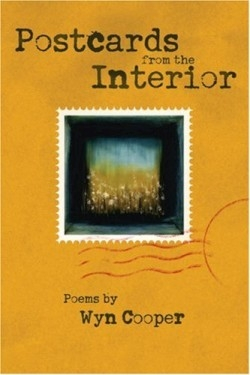Postcards from the Interior
Between Mitchell, South Dakota with its corn palace, and Halifax, Vermont, the “spiritual center of the universe,” in a dingy bar beside a forgotten highway, one could easily find this poet busy scribbling another postcard from the interior. In one such tavern, Cooper writes, “the locals try to make me talk— / fill me with beer, slap my back, tell me / I’ve come all this way for nothing.”
Despite a certain existential emptiness that may be de rigeur in contemporary American poems, Cooper’s fifty-two postcards, ranging in style from tightly constructed quatrains to prose-poems, lead readers into rural environs that are haunted respites from more urban and urbane concerns. Many of these poems, so particularly rooted in specific locales, record the obvious and by so doing elevate the mundane into psychological landscapes replete with metaphorical sights and characters: “Puddles nearly blind me as I walk / the only street: five Victorians, three / doublewides, one store and a mobile. // The first man I see on the sidewalk / grabs my arm and won’t let go.”
Cooper, the author of two previous books of poetry, may be better known as the inspiration behind Cheryl Crow’s Grammy-winning “All I Wanna Do,” and novelist Madison Smart Bell’s CD Forty Words for Fear. Currently, he serves on the advisory board of The Frost Place in New Hampshire, as well as helping to organize the Brattleboro Literary Festival. He works the postcard motif well: generally short generic missives extolling all the excitement of an unnoticed backwater—excitement, often hyperbolic and overblown, that someone else somewhere else is missing.
The New England landscape of the book’s first section, “Postcards from Vermont,” gives Cooper a wide, but familiar range of topics from literal postcard images circa 1910 to allegorical locations that are saturated products of the poet’s imagination. Throughout the section, one senses Li Po’s presence, transitory and reflective, finding the foreign in the familiar: “What greater pleasure than this, to sit / outside in late April, in Vermont, / and watch the snow blow in from Boston.”
Perhaps for Cooper the prosaic is a form of post-modern Prozac, mediating between the sense of the “boundless / nada of the new millennium” and the understanding that even the most bucolic scene in the twenty-first century “isn’t paradise after all.” Within the landscape that Cooper traverses, peopled by the odd, the forgotten, the overlooked, one finds a sense of community that is an anodyne for anonymity. While all postcards by their nature intimate absence and loss, Cooper’s Postcards from the Interior hints at a redemption found in relationships, the true spiritual center of the book: “When the dust finally settles / you’re home mending fences / to protect the peaches you give / to women whose names rhyme / with fauna, quill, lavender, and fizz.”
Reviewed by
Duncan Sprattmoran
Disclosure: This article is not an endorsement, but a review. The publisher of this book provided free copies of the book to have their book reviewed by a professional reviewer. No fee was paid by the publisher for this review. Foreword Reviews only recommends books that we love. Foreword Magazine, Inc. is disclosing this in accordance with the Federal Trade Commission’s 16 CFR, Part 255.

